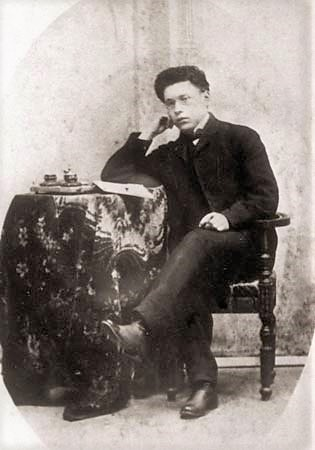Janka Maŭr
, 1883 - 1971
Janka Maŭr, a famous Soviet Belarusian writer, is one of the most popular authors for children in the former Soviet Union. He was born in Liepāja (Latvia) and spent his childhood in the village of Lebianiški (then in the Belarusian Soviet Socialist Republic; now the village is in Lithuania, and the name in Lithuanian is Lebeniškiai). In 1899 Maŭr enrolled in a pedagogical school in Panevėžys, but was expelled in his final year of study for his liberal views and “religious doubts.” In 1903, he passed all the exams as an extern and started working as a village teacher. In 1906, Maŭr took part in an underground meeting of Belarusian teachers in the village of Mikałajeŭščyna; as a result he was arrested and dismissed from school. He resumed teaching only in 1911.
He blends in his works a wide range of genres: adventure fiction, historical fiction, fairy tales and satire. He is also known as the founder of science fiction tradition in Belarusian literature. His most popular book is Palesse Robinsons (1929). It describes the adventures of two boys on a small island during the high-water period in the Palesse region. Among the other of his famous books are titles such as: In the Country of the Paradise Bird (1926), The Son of Water (1927), Amok (1928), The Story of the Future Days (1932), Around the World (1947), TVT (1934, reworked in 1949). Books by Janka Maŭr were translated into Russian, Ukrainian, Armenian, Tajik, Lithuanian, Polish, Czech, German, and Romanian.
Bio prepared by Maria Pushkina, National Academic Janka Kupała Theatre, maryiapushkina@gmail.com
Records in database:



